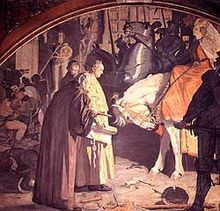Hedwig of Saxony (1445–1511)
Hedwig of Saxony (born October 31, 1445 in Meißen , † June 13, 1511 in Quedlinburg ) was a princess of Saxony and the 26th abbess of the Imperial Monastery of Quedlinburg.
Life
Origin and family
Hedwig was the youngest child of Elector Friedrich II of Saxony (1412–1464) from his marriage to Margarete (1416 / 7–1486), daughter of Duke Ernst of Austria. Through her mother, she was a niece of Emperor Friedrich III. , her brothers Albrecht and Ernst are the founders of the Albertine and Ernestine lines of the Saxon house; her sister Anna had been Electress of Brandenburg since 1470 and her sister Amalia Duchess of Bavaria-Landshut .
Abbess of Quedlinburg
Hedwig was elected canon in Quedlinburg in 1457 and, at the age of 12, was elected abbess a year later to succeed Anna I, who died in 1458. Pope Calixt III. confirmed the election in 1458 on the condition that Hedwig should act under the tutelage of her father and a canon until she was 20. 1465 it was by Emperor Friedrich III. enfeoffed with the regalia and ruled independently.
In 1460, disputes began with the city of Quedlinburg, which had joined the Hanseatic League in 1426 and was striving to become a free imperial city and to break away from the suzerainty of the monastery. The quarrels broke out about mistakenly felled wood from the forest of the Reichsstift and extended to mills, coinage, the protection of Jews and fishing rights. After mediation by Hedwig's father and the mayor of Halberstadt , the conflict flared up again in 1474 over bailiwick rights . With the support of her brothers, Hedwig obtained the confirmation of the bailiff's rights by the emperor in 1475. Gebhard von Hoym , Bishop of Halberstadt and previous owner of the bailiff's rights, protested to the pope and the city of Quedlinburg concluded a protective alliance with the Brunswick dukes in 1475 .
After an arbitration date had passed, the citizens, supported by the Halberstadt bishop, prepared for a military incursion and assembled a force of 200 men who tried to forcefully drive the abbess out. On July 24, 1477, Saxon troops of the Hedwigs brothers conquered the city with 400 horsemen and 200 foot soldiers. Quedlinburg finally submitted to the abbess on August 9, 1477 and had to pay annual reparations and an amount to rebuild the castle. The city lost its autonomy, the Roland was overthrown, Quedlinburg had to withdraw from the Hanseatic League and all protective alliances and pay hereditary homage to the abbess. Without the consent of the abbess, the city could neither elect a council, nor a governor, or repair the city fortifications. Urban development suffered a decisive setback; In the following centuries Quedlinburg remained a small agricultural town .
In peace with the Bishop of Halberstadt, Hedwig was awarded the bailiwick and the rights to Groß- Ditfurt . Hedwig transferred the bailiwick rights to her brothers Albrecht and Ernst as a thank you in 1479.
In her last years in office, Hedwig's nephew Ernst , Archbishop of Magdeburg, tried to enforce the protectorate claims of his predecessors as administrator of Halberstadt. He succeeded in winning the Pope Julius II as an ally, who threatened Hedwig with the church ban. Hedwig was considered strict and serious, but also pious and charitable. From Emperor Friedrich III. she was accepted into the Kannenorden . Hedwig is buried in the collegiate church of St. Servatius in Quedlinburg.
ancestors
| Pedigree Hedwig of Saxony | ||||||||
|---|---|---|---|---|---|---|---|---|
| Great-great-grandparents |
Margrave |
Heinrich VIII von Henneberg-Schleusingen |
Duke |
Wartislaw VI. (1345–1394) |
Duke |
Bernabò Visconti (1323–1385) |
?
|
Algirdas (1296–1377) |
| Great grandparents |
Margrave Friedrich III. (1332–1381) |
Duke Heinrich I of Braunschweig-Lüneburg (1355–1416) |
Duke Leopold III. (1351–1386) |
|||||
| Grandparents |
Elector Friedrich I of Saxony (1370–1428) |
Duke Ernst the Iron (1377–1424) |
||||||
| parents |
Elector Friedrich II. (1412–1464) |
|||||||
|
Hedwig of Saxony |
||||||||
literature
- Johann Heinrich Fritsch: History of the former Reichsstift and the city of Quedlinburg. Quedlinburg 1828, p. 202 ff. ( Digitized version )
- Karl Janicke: Hedwig, abbess of Quedlinburg . In: Allgemeine Deutsche Biographie (ADB). Volume 11, Duncker & Humblot, Leipzig 1880, pp. 227-229.
- Regina-Bianca Kubitscheck: Hedwig of Saxony, Abbess of Quedlinburg. In: Biographisch-Bibliographisches Kirchenlexikon (BBKL). Volume 20, Bautz, Nordhausen 2002, ISBN 3-88309-091-3 , Sp. 569-572.
- Friedrich Albert von Langenn: Duke Albrecht the brave, ancestor of the royal house of Saxony . P. 118 ff. ( Digitized version )
- Michael Vollmuth-Lindenthal: Abbess Hedwig von Quedlinburg. Reichsstift und Stadt Quedlinburg at the end of the 15th century , in: Mitteldeutsche Lebensbilder. People in the late Middle Ages , ed. v. Werner Freitag, Böhlau, Cologne a. a. 2002, pp. 69-88.
Web links
- Chronicle of the city of Quedlinburg from 1400 to 1500 AD ( Memento from December 5, 2009 in the Internet Archive )
| predecessor | Office | Successor |
|---|---|---|
| Anna I. Reuss of Plauen |
Abbess of Quedlinburg 1458–1511 |
Magdalene of Anhalt-Koethen-Zerbst |
| personal data | |
|---|---|
| SURNAME | Hedwig of Saxony |
| BRIEF DESCRIPTION | 26. Abbess of the Imperial Monastery of Quedlinburg |
| DATE OF BIRTH | October 31, 1445 |
| PLACE OF BIRTH | Meissen |
| DATE OF DEATH | June 13, 1511 |
| Place of death | Quedlinburg |

